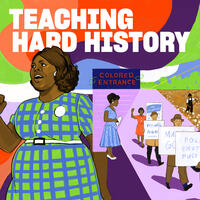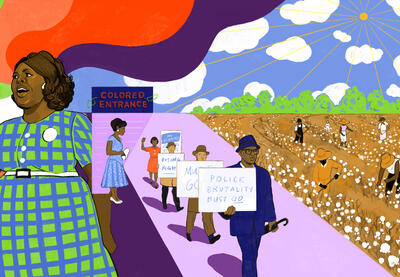Season 1: American Slavery
Season 1 offers an in-depth look at aspects of the history of American slavery and how to teach this hard history. Each episode explores a different topic and historical concepts, raises questions for discussion, suggests resources and offers practical teaching recommendations. (This season originally aired 2018-2019).
Please note that podcast episodes are currently being updated to highlight essential ideas from each episode along with teaching recommendations and additional resources. All podcast episodes and transcripts are still available.

Episode 1: Slavery and the Civil War, Part 1
What really caused the Civil War? In this episode, Salem State University professor Bethany Jay examines the complex role that slavery played in causing the Civil War and outlines ways to teach this history and clarify our understanding of the Confederacy. (New resource page, Jun. 2025.)

Episode 2: Slavery and the Civil War, Part 2
Salem State University professor Bethany Jay examines how the actions of free and enslaved African Americans shaped the progress of the Civil War and contributed to emancipation. (New resource page, Jun. 2025.)

Episode 3: Slavery and the Northern Economy
When we think of slavery as a strictly Southern institution, we perpetuate a “dangerous fiction,” according to historian Christy Clark-Pujara. This episode examines the North’s role in perpetuating slavery and the truth behind the phrase “slavery built the United States.” (New resource page, Jul. 2025.)

Episode 4: Doing the Work of Teaching Hard History
In many ways, the U.S. has fallen short of its ideals. How can we explain this to young people — particularly in the context of discussing slavery? Salem State University professor Steven Thurston Oliver shares practical strategies. (New resource page, Jul. 2025.)

Episode 5: In the Footsteps of Others: Process Drama
In learning about slavery, students often ask, “Why didn’t enslaved people run away or revolt?” Lindsay Anne Randall explains “process drama” — a method to help build empathy and understand the risks and complexities that enslaved individuals faced. (New resource page, Jul. 2025.)

Episode 6: Resistance Means More Than Rebellion
For a more complete picture of enslaved people’s experiences, we need to expand our understanding of resistance. Kenneth S. Greenberg, Ph.D., examines the numerous ways enslaved African Americans incorporated resistance into every aspect of their lives, offering a lens to help students see how enslaved people fought back against the brutality of slavery. (New resource page, Aug. 2025.)

Episode 7: Diverse Experience of the Enslaved
The experiences of enslaved people varied greatly based on a variety of factors, including time, location, crop, labor performed, size of slaveholding and gender. Yet, most students leave school thinking enslaved people lived like the biased representation in Gone With the Wind. Deirdre Cooper Owens, Ph.D., discusses how the lived experience of slavery varied and evolved. (New resource page, Sept. 2025.)

Episode 8: Film and the History of Slavery
Film historian Ron Briley offers ways to responsibly use films in the classroom to more accurately frame the narrative of American slavery and Reconstruction. (New resource page, Sept. 2025.)

Episode 9: (Bonus) Ten More … Film and the History of Slavery
Film historian Ron Briley returns with more suggestions for teaching through film — from thought-provoking documentaries and feature films to miniseries. Spanning productions from the works of Ken Burns to the blockbuster Black Panther, this episode offers essential background information and practical strategies. (New resource page, Oct. 2025.)

Episode 10: Slavery in the Constitution
Constitutional and legal historian Paul Finkelman explains the critical role slavery played in the founding of the United States and how the politics of slavery shaped in U.S. Constitution in ways that are still evident today. (New resource page, Nov. 2025.)
NEW Resource Pages Coming Soon:
Episode 11: Slavery in the Supreme Court
In the United States, justice was never blind. Historian Paul Finkelman goes beyond legal jargon to illustrate how slavery was entangled with the opinions of the Court—and encoded into the Constitution itself. (Page update coming soon.)
Episode 12: Confronting Hard History at Montpelier
At James Madison’s Montpelier, the legacy of enslaved people isn’t silenced—and their descendants have a voice. Christian Cotz, Price Thomas and Dr. Patrice Preston Grimes explain how that happened, and why it’s important. (Page update coming soon.)
Episode 13: Slavery Today
Enslavement didn’t end with Emancipation. Historian James Brewer Stewart discusses modern-day slavery happening across the world — and right here in the U.S. — showing educators how to connect the past with the present. (Page update coming soon.)
Episode 14: Classroom Experiences
How it’s done. Tamara Spears teaches middle school Social Studies in New York and Jordan Lanfair is a high school English Language Arts teacher in Chicago. Each has been developing additional lessons about slavery for years. They share their experiences. (Page update coming soon.)
Episode 15: Sample Lessons
Using the present to explore the past. Tamara Spears and Jordan Lanfair suggest a Social Studies unit about Resistance and Kanye West, and a set of English Language Arts lessons examining holidays to understand the legacy of American slavery. (Page update coming soon.)
Episode 16: Young Adult Trade Books
From elementary to high school, young adult literature can introduce fundamental themes and information about slavery, especially when paired with primary sources. John H. Bickford shows how to capitalize on the strengths and weaknesses of trade books about slavery. (Page update coming soon.)
Episode 17: Wrap up: Questions from the Classroom
Historian Bethany Jay returns – answering questions from educators across the country. Host Hasan Kwame Jeffries and the coeditor of Understanding and Teaching American Slavery confront teacher anxieties and counter misconceptions in our season finale. (Page update coming soon.)
Teaching Hard History podcast illustration by Noa Denmon
